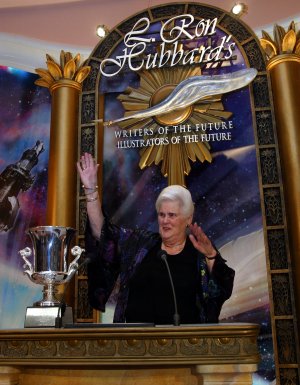$cient ology is not just ridiculous, it's dangerous. For example, google Lisa McPherson (R.I.P.) who died in the 'care' of members of that organisation (the religion tag is purely for tax-exempt status in the u.s.). Beware. The quote below comes from factnet . org - cheers, squawk, Galah.
Bear, Greg (Author):
"The delusional, no-talent charlatans may scoop in more money, but the game is truly not worth the coin. I sleep much better at might than they should. This brings up a case in point that illustrates the real role of skepticism in science fiction. Rumor has it that L. Ron Hubbard, a pretty good science fiction writer of the 1940s, made a conscious decision that science fiction was a mug's game and that the real money was in starting a religion. So he did, using science fiction magazines and a gullible, though very famous, science fiction editor to get his start. No one knows whether he eventually came to believe in what he wrote and sold to others as revealed truth. If I had been Hubbard, I would not have been able to convince myself. I suspect most charlatans realize that they have perverted very real, very useful aesthetic instincts to hoodwink large numbers of gullible people into believing and paying. When we stop being artists, and start being money-grubbing pseudo-prophets, the net is down, the ball can go anywhere in the court, and the audience has changed. This audience knows so little, and cares so little about the truth, that it oohs and aahs at every random serve, every double bounce, every net ball. It does not perceive the difference between an earned point and a flub. The charlatan on the court smiles and receives applause for all. That's not our audience. That's not my game." - Greg Bear in the Skeptical Inquirer, September/October 1996, writing about the relationship between sci-fi and skepticism. His contribution was called Skepticism and Science Fiction (pp 24-25).


